Like Father, Like Son Blu-ray Movie
HomeLike Father, Like Son Blu-ray Movie 
そして父になる / Soshite chichi ni naru / Blu-ray + DVDArrow | 2013 | 121 min | Rated BBFC: PG | No Release Date
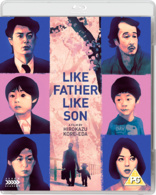
Price
Movie rating
7.9 | / 10 |
Blu-ray rating
| Users | 0.0 | |
| Reviewer | 4.0 | |
| Overall | 4.0 |
Overview
Like Father, Like Son (2013)
Would you choose your natural son, or the son you believed was yours after spending 6 years together? Kore-eda Hirokazu, the globally acclaimed director of "Nobody Knows", "Still Walking" and "I Wish", returns to the big screen with another family - a family thrown into torment after a phone call from the hospital where the son was born... Ryota has earned everything he has by his hard work, and believes nothing can stop him from pursuing his perfect life as a winner. Then one day, he and his wife, Midori, get an unexpected phone call from the hospital. Their 6-year-old son, Keita, is not 'their' son - the hospital gave them the wrong baby. Ryota is forced to make a life-changing decision, to choose between 'nature' and 'nurture.'
Starring: Masaharu Fukuyama, Machiko Ono, Yôko Maki, Jun Fubuki, Jun KunimuraDirector: Hirokazu Kore-eda
| Foreign | Uncertain |
| Drama | Uncertain |
Specifications
Video
Video codec: MPEG-4 AVC
Video resolution: 1080p
Aspect ratio: 1.85:1
Original aspect ratio: 1.85:1
Audio
Japanese: LPCM 2.0 (48kHz, 24-bit)
Japanese: DTS-HD Master Audio 5.1 (48kHz, 24-bit)
Subtitles
English
Discs
Blu-ray Disc
Two-disc set (1 BD, 1 DVD)
DVD copy
Playback
Region B (A, C untested)
Review
Rating summary
| Movie | 4.0 | |
| Video | 4.0 | |
| Audio | 4.0 | |
| Extras | 3.5 | |
| Overall | 4.0 |
Like Father, Like Son Blu-ray Movie Review
Reviewed by Jeffrey Kauffman May 26, 2018Note: This version of the film is available as part of Family Values: Three Films by Hirokazu Kore-eda.
The good folks at Arrow Video and/or Arrow Academy may be thanking their lucky stars that Hirokazu Kore-eda has just been feted with the Palme
d’Or at this year’s Cannes Festival (for Shoplifters), an award that may raise the profile of their so-called Family Values set of
three
Kore-eda films from the past several years. The timing for Kore-eda's award may seem especially fortuitous since this set, while not brand new,
seems to be a repackaging (with some additional non-disc swag like a rather nicely done booklet) of three standalone releases that Arrow brought
out
not all that long ago (I Wish, Like Father, Like Son, After the Storm). As is discussed in some of the supplements included on this release, Kore-eda’s long
history in Japan’s television industry tends to give his feature films a smaller scale, more intimate ambience, and it probably can’t be denied that at
least some plot points in the three films in this set might be perfectly at home in what might be termed a “Lifetime Channel Very Special
Film Made for Television” category. That said, Kore-eda is a remarkably facile director with children, and all three films explore a kind of childlike
perspective that in some ways tended to remind me of the work of Robert Mulligan (To Kill a Mockingbird, The
Other), at least in terms of Mulligan’s ability to capture an honest depiction of how kids see the world around them, if not in any pure
content way. All three films delve into family dysfunctions in sometimes visceral ways, though often in an emotionally tamped down ambience
that seems to be perfectly Japanese, where deep emotions are masked out what may be a fear that some kind of “communal” peace (however
illusory) might be disturbed.
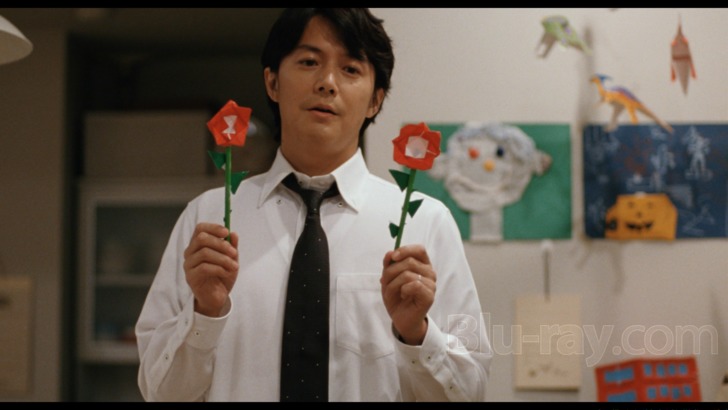
If I Wish reminded me most of Robert Mulligan’s work with children out of the three films in the Family Values set, Like Father, Like Son probably is most reminiscent of certain Lifetime-esque heartstring pulling affairs, though it’s fascinating to see how Kore-eda takes a basic Switched at Birth setup and filters it through a uniquely Japanese perspective. Once again seemingly uncontrollable emotions arising out of a horrifying error are kept at bay, until a fairly cathartic moment late in the film when everything comes spilling out.
Ryota Nonomiya (Masaharu Fukuyama) is a successful businessman with a lovely wife named Midori (Machiko Ono) and darling little boy named Keita (Keita Ninomiya). The Nonomiyas are trying to get Keita accepted at a tony school as the film opens, and the panel interviewing them asks which parent Keita is most like and what, if anything, the little boy could do better at. Already, there’s a slightly askew feeling about things, as Ryota mentions that Keita tends to be more like Midori and that some of Keita’s lack of ambition chafes against Ryota’s Type A sensibilities. A bit later an unexpected revelation sets the actual plot in motion, as Ryota and Midori are stunned to find out that Keita is in fact not their biological son.
Perhaps expectedly, the dumbstruck Nonomiyas meet the other couple affected by this fiasco, Yukari (Yōko Maki) and Yudai Sakai (Lily Franky), who have been parenting Ryusei (Shôgen Hwang), who is of course the biological son of the Nonomiyas. But here Kore-eda perhaps toys at least a little with expectations, making the Sakais a more rustic, rural (and supposedly “uneducated”) couple who nonetheless see the hospital mistake as a potential ticket toward monetary damages. Interestingly, though, Kore-eda doesn’t really paint the Sakais as villains in any major sense, and the film tends to explore the situation with a surprising amount of nuance, leading, after some interstitial melodrama, to what might be thought of as a Japanese interpretation of what constitutes a “Modern Family”.
Like Father, Like Son Blu-ray Movie, Video Quality 
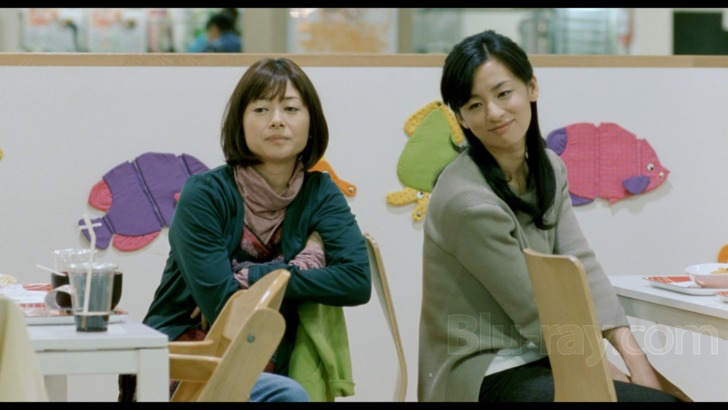
All three films in the Family Values set are presented on Blu-ray courtesy of Arrow Academy with AVC encoded 1080p transfers in 1.85:1. I
have to say I was genuinely surprised to not find any information about the transfers in any of the material accompanying this release, a first (or at
least what I'm recalling as a first) for an Arrow release. I even looked at the back covers of the previously released standalone versions (linked to
above in the first paragraph of the review), and kind of interestingly, none of those seemed to have any information about the transfers on
them, either. With that said, all three of these films share certain similarities (including the fact that all were shot on 35mm and finished at 2K DIs,
according to the IMDb), so I'll speak in generalities before moving on to each film in particular.
From a damage or age related issue perspective, these are absolutely flawless transfers, no doubt due at least in part to their relatively recent
vintage.
Fine grain also looks natural on all three transfers for the most part (exceptions are noted below). My one slight qualm with all three of these is that
they look just slightly bright at times to my eyes,
something that tends to make contrast a bit anemic, especially in what are already more brightly lit moments. That said, palettes, while not
especially
vivid in any of the three films, look decently saturated, though as I'll discuss in the following individual comments, things can look a bit odd at times
in
terms of a "natural" appearance.
Like Father, Like Son's palette looks a little desaturated and cool in the very opening interview sequence, but warms up considerably
thereafter. While not overly vivid, colors look natural, though the film tends to emphasize cooler pastels a lot of the time. The opening interview
sequence features a really bright white background where fine grain can be hard to spot, but that's countered by several dark scenes where grain
actually tends to clump a bit, encountering some compression hurdles. The first of these is at around 5:43 with a quick establishing exterior shot
that may actually be stock footage, but then the same clumpiness accrues in another dark scene in the apartment at around 11:43 that is definitely
not stock since it features three principal performers. A few isolated sequences, like the first meeting of the parents, have a somewhat greenish tint
to them that tends to make things like flesh tones look rather odd. Detail levels are generally quite commendable throughout the presentation.
Like Father, Like Son Blu-ray Movie, Audio Quality 
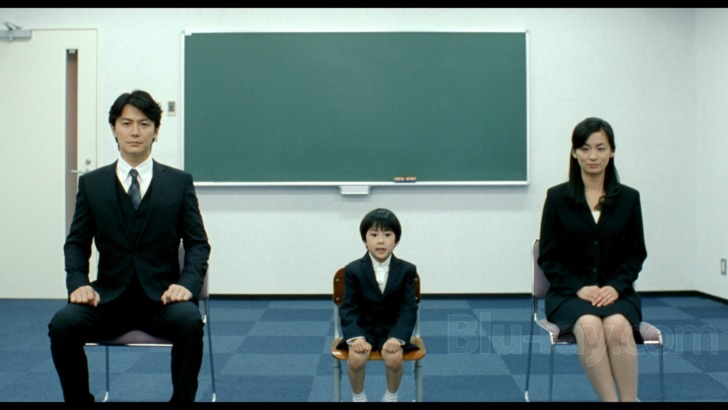
All three of the films in this set offer either DTS-HD Master Audio 5.1 or LPCM 2.0 tracks. The LPCM 2.0 tracks on both Like Father, Like Son and After the Storm sounded like they had slightly heftier amplitude than their respective surround tracks, something that I Wish didn't. All three films feature rather winning scores, with I Wish offering both guitars (an allusion to the kids' rock star wannabe Dad, I'm assuming) as well as some really breezy "Stephane Grappelli"-esque violin cues. Like Father, Like Son has some very sweet solo piano, again alluding to some father-son activities. After the Storm has a more pop oriented score. The surround tracks on all three films benefit from good placement of ambient environmental sounds, and dialogue on all three films comes through very cleanly and clearly.
Like Father, Like Son Blu-ray Movie, Special Features and Extras 
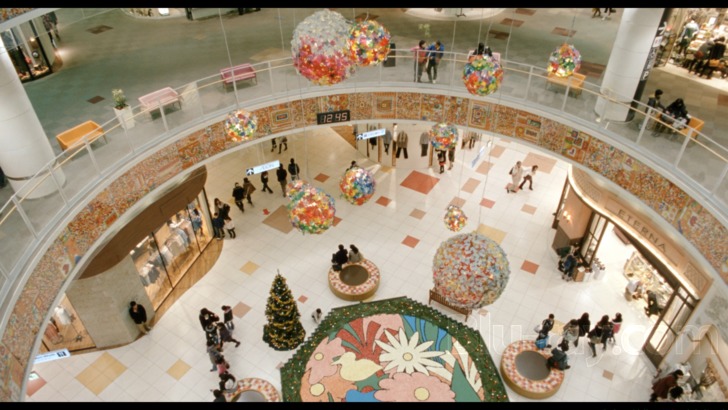
- Family Ties Part II (HD; 11:34) continues Jasper Sharp's conversation with Kore-eda begun on I Wish, with comments on Like Father, Like Son filmed at the BFI's London Film Festival in 2016.
- Nature vs. Nurture (HD; 19:08) features Alexander Jacoby discussing the film and some of its underlying plot points.
- Selected Scene Commentary (HD; 1:07:43) offers picture in picture commentary from Masaharu Fukuyama and Lily Franky (in Japanese with forced English subtitles).
- Like Father, Like Son in Cannes (HD: 22:35) is from 2013 and features some Q & A with Masaharu Fukuyama.
- In Conversation with Kore-eda: Masaharu Fukuyama (HD; 11:16) offers a dialogue from October 2013.
- Wrap Footage (HD; 6:08)
- Trailers
- Trailer 1 (HD; 00:36)
- Trailer 2 (HD; 00:56)
- Trailer 3 (HD; 1:44)
- Trailer 4 (HD; 00:17)
- Trailer 5 (HD; 00:32)
Like Father, Like Son Blu-ray Movie, Overall Score and Recommendation 
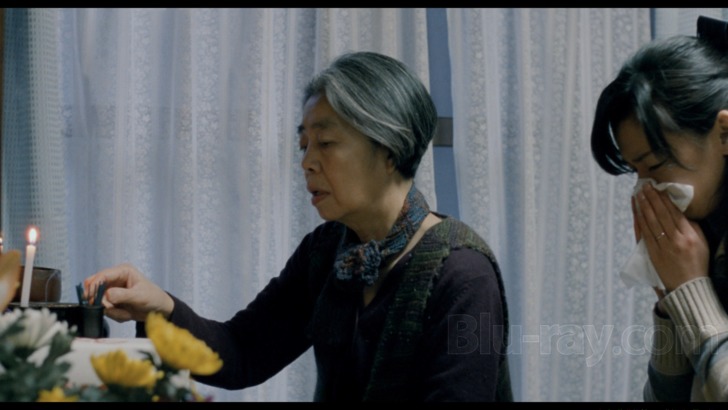
Like Father, Like Son builds to a surprisingly cathartic resolution, and it commendably avoids some of the pitfalls that its "Lifetime" premise might have presented. Once again, performances are top notch, including those of the kids, and the treatment of an inherently touchy subject is handled with nuance and emotional authenticity. Recommended.
Other editions
Like Father, Like Son: Other Editions
Similar titles
Similar titles you might also like
(Still not reliable for this title)

I Wish
奇跡 / Kiseki
2011

After the Storm
海よりもまだ深く/ Umi yori mo mada fukaku / Arrow Academy
2016

Our Little Sister
海街diary / Umimachi Diary
2015

Nobody Knows
誰も知らない / Dare mo shiranai
2004

Still Walking
歩いても 歩いても / Aruitemo aruitemo
2008

The Third Murder
三度目の殺人 / Sandome no Satsujin | Arrow Academy
2017

Shoplifters
万引き家族 / Manbiki kazoku
2018

Loveless
Нелюбовь / Nelyubov
2017

Departures
おくりびと / Okuribito
2008

Mustang
2015

Norte, the End of History
Norte, hangganan ng kasaysayan
2013

Kikujiro
菊次郎の夏 / Kikujirô no natsu
1999

A Touch of Sin
天注定 / Tiān zhù dìng
2013

The Hunt
Jagten / Arrow Academy
2012

My Life as a Courgette
Ma vie de Courgette / My Life as a Zucchini
2016

Burning
버닝 / Beoning
2018

Bastards
Les salauds
2013

Zéro de conduite 4K
1933

Maborosi
幻の光 / Maboroshi no hikari
1995

Yi Yi
一一 / A One and a Two
2000
